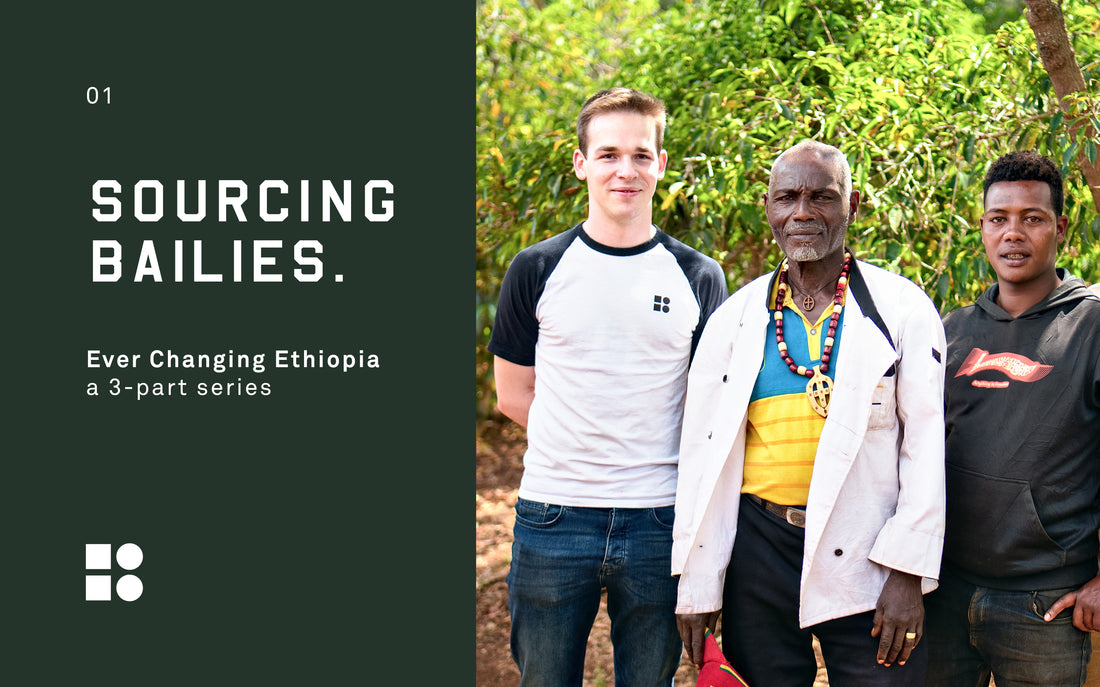As many of our followers may know, fostering long-term and sustainable relationships with our farmer’s and communities is an integral part of what we are about here at Bailies.
We are a small but growing business built on direct trade, and the current man tasked with the responsibility of sourcing the harvest is Jan Komarek, the head of quality control and green coffee buyer of Bailies Coffee Roasters.

Coffee is one of the world’s most traded commodities, with Jan’s most recent trip taking us from Ethiopia to Kenya and back in pursuit of coffee, competition and auctions. But we are getting ahead of ourselves.
This trip was just over two weeks long, it was found to be near impossible to write up this story without branching off into the various other adventures, so we decided a mini-series may be the best way to go.

First stop, Ethiopia.
After an eventful 8hr flight which saw delays, passed-out passengers and dramatic medical rescues, Jan finally landed in the city of Addis Ababa- Ethiopia’s sprawling capital in the highlands bordering the Great Rift Valley.
First on his mind, in all fairness was not coffee, but food, which in Ethiopia means one thing- Injera. The national dish of Ethiopia this sourdough-risen flatbread is everywhere, which for Jan meant this fermented teff flour dish was on the menu three times a day for the next seven days. Despite his best attempts to spice it up with spinach or meat, even Jan’s best Amharic meant an order of injera…with a side of injera.

Despite lacking in culinary options, Ethiopia is a country not only rich in coffee but also steeped in history, with a turbulent past of civil war and political conflicts between 1970s-90s, which had resounding consequences for the coffee industry and trade.
So, next stop - Seife’s.
A friend of Jan, Seife had been adopted by a Swedish family, meaning he was blessed with dual citizenship which enabled him to start his own import company, exporting from Ethiopia to Sweden.
However, in 2008 Ethiopia began the centralization of all coffee exports through the newly established Ethiopia Commodity Exchange (ECX). This eliminated most roasters’ and importers’ ability to provide accurate information of the precise traceability of coffees (1).
The vast majority of coffee was transported to the ECX, mixed and then auctioned. This resulted in it losing much of its value because its origin was untraceable, a key requirement in the speciality industry (2).

As these more and more tricky export laws came into play Seife moved to work for one of the larger, most popular coffee exporters/importers, believing in their ethical and tracible mantras. However, their claims of traceability in Ethiopia started to cause doubt, considering tracible coffee during these years was illegal. This, combined with constantly evolving laws, saw Seife restart his own company.
This was aided by the changes made only recently by the Ethiopian parliament. Having been plagued with traceability issues as a consequence of the mandatory role the ECX played in exporting green coffee, changes were sent in motion in 2017 (4).
From then, the coffee grower could sell their coffee before reaching the floor of ECX within three days in addition to being kept separate until it is called upon for auction, enabling traceability and direct trade (5).
There is great hope and expectation that these changed laws will continue to stimulate higher production due to the increased traceable supplier from one of the world’s largest and most premiere producers (6).
Bailies were able to introduce our own Hunkute as our traceable Ethiopian offering of this season, belonging to the Sidama Cooperative Union.
Having reunited with Seife, whose business has since evolved to develop a small coffee mill, Jan was able to cup a few of these coffees before embarking on the next leg of his travels.
The changing laws is not only great news for the coffee farmers but as generated a lot of excitement at the Roastery as we can add an Ethiopian coffee to our Bailies Direct Trade label, with Jan ensuring that the chosen coffee meets our set criteria which you can read about here- But of course, the most important lesson to be learnt from this is that before going to Ethiopia, make sure to brush up on your Amharic to avoid an order of fermented bread on bread.
Citations:
- Gashaw, B. and Kibret, S. (2019). The Role of Ethiopian Commodity Exchange (ECX) in Crop Value Chain Development in Ethiopia. [online] Sciencepublishinggroup.com. Available at: http://www.sciencepublishinggroup.com/journal/paperinfo?journalid=178&doi=10.11648/j.ijber.20180706.12 [Accessed 7 May 2019].
- Ft.com. (2019). Ethiopia aims at transforming speciality coffee market | Financial Times. [online] Available at: https://www.ft.com/content/020bc846-393a-11e7-821a-6027b8a20f23 [Accessed 10 Apr. 2019]. found at https://www.ft.com/tour.
- Fortune, A. (2019). Coffee Market Reform Gets Green Light. [online] Addisfortune.net. Available at: https://addisfortune.net/articles/coffee-market-reform-gets-green-light/ [Accessed 10 Apr. 2019].
- Fortune, A. (2019). Coffee Market Reform Gets Green Light. [online] Addisfortune.net. Available at: https://addisfortune.net/articles/coffee-market-reform-gets-green-light/ [Accessed 10 Apr. 2019].
- Ft.com. (2019). Ethiopia aims at transforming speciality coffee market | Financial Times. [online] Available at: https://www.ft.com/content/020bc846-393a-11e7-821a-6027b8a20f23 [Accessed 10 Apr. 2019]. found at https://www.ft.com/tour.
